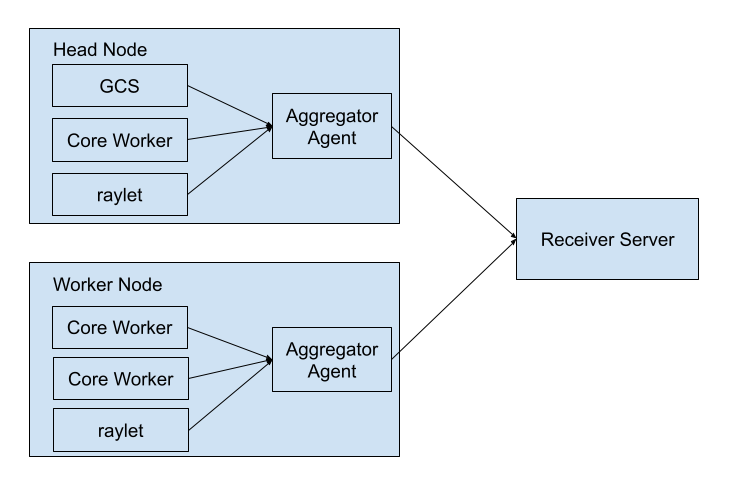Ray Event Export#
Starting from 2.49, Ray supports exporting structured events to a configured HTTP endpoint. Each node sends events to the endpoint through an HTTP POST request.
Previously, Ray’s task events were only used internally by the Ray Dashboard and State API for monitoring and debugging. With the new event export feature, you can now send these raw events to external systems for custom analytics, monitoring, and integration with third-party tools.
Note
Ray Event Export is still in alpha. The way to configure event reporting and the format of the events is subject to change.
Enable event reporting#
To enable event reporting, you need to set the RAY_enable_core_worker_ray_event_to_aggregator environment
variable to 1 when starting each Ray worker node.
To set the target HTTP endpoint, set the RAY_DASHBOARD_AGGREGATOR_AGENT_EVENTS_EXPORT_ADDR
environment variable to a valid HTTP URL with the http:// URL scheme.
Event format#
Events are JSON objects in the POST request body.
All events contain the same base fields and different event specific fields. See src/ray/protobuf/public/events_base_event.proto for the base fields.
Task events#
For each task, Ray exports two types of events: Task Definition Event and Task Execution Event.
Each task attempt generates one Task Definition Event which contains the metadata of the task. See src/ray/protobuf/public/events_task_definition_event.proto and src/ray/protobuf/public/events_actor_task_definition_event.proto for the event formats for normal tasks and actor tasks respectively.
Task Execution Events contain task state transition information and metadata generated during task execution. See src/ray/protobuf/public/events_task_lifecycle_event.proto for the event format.
An example of a Task Definition Event and a Task Execution Event:
// task definition event
{
"eventId":"N5n229xkwyjlZRFJDF2G1sh6ZNYlqChwJ4WPEQ==",
"sourceType":"CORE_WORKER",
"eventType":"TASK_DEFINITION_EVENT",
"timestamp":"2025-09-03T18:52:14.467290Z",
"severity":"INFO",
"sessionName":"session_2025-09-03_11-52-12_635210_85618",
"taskDefinitionEvent":{
"taskId":"yO9FzNARJXH///////////////8BAAAA",
"taskFunc":{
"pythonFunctionDescriptor":{
"moduleName":"test-tasks",
"functionName":"test_task",
"functionHash":"37ddb110c0514b049bd4db5ab934627b",
"className":""
}
},
"taskName":"test_task",
"requiredResources":{
"CPU":1.0
},
"serialized_runtime_env": "{}",
"jobId":"AQAAAA==",
"parentTaskId":"//////////////////////////8BAAAA",
"placementGroupId":"////////////////////////",
"taskAttempt":0,
"taskType":"NORMAL_TASK",
"language":"PYTHON",
"refIds":{
}
},
"nodeId":"ZvxTI6x9dlMFqMlIHErJpg5UEGK1INsKhW2zyg==",
"message":""
}
// task lifecycle event
{
"eventId":"vkIaAHlQC5KoppGosqs2kBq5k2WzsAAbawDDbQ==",
"sourceType":"CORE_WORKER",
"eventType":"TASK_LIFECYCLE_EVENT",
"timestamp":"2025-09-03T18:52:14.469074Z",
"severity":"INFO",
"sessionName":"session_2025-09-03_11-52-12_635210_85618",
"taskLifecycleEvent":{
"taskId":"yO9FzNARJXH///////////////8BAAAA",
"stateTransitions": [
{
"state":"PENDING_NODE_ASSIGNMENT",
"timestamp":"2025-09-03T18:52:14.467402Z"
},
{
"state":"PENDING_ARGS_AVAIL",
"timestamp":"2025-09-03T18:52:14.467290Z"
},
{
"state":"SUBMITTED_TO_WORKER",
"timestamp":"2025-09-03T18:52:14.469074Z"
}
],
"nodeId":"ZvxTI6x9dlMFqMlIHErJpg5UEGK1INsKhW2zyg==",
"workerId":"hMybCNYIFi+/yInYYhdc+qH8yMF65j/8+uCTmw==",
"jobId":"AQAAAA==",
"taskAttempt":0,
"workerPid":0
},
"nodeId":"ZvxTI6x9dlMFqMlIHErJpg5UEGK1INsKhW2zyg==",
"message":""
}
Actor events#
For each actor, Ray exports two types of events: Actor Definition Events and Actor Lifecycle Events.
An Actor Definition Event contains the metadata of the actor when it is defined. See src/ray/protobuf/public/events_actor_definition_event.proto for the event format.
An Actor Lifecycle Event contains the actor state transition information and metadata associated with each transition. See src/ray/protobuf/public/events_actor_lifecycle_event.proto for the event format.
// actor definition event
{
"eventId": "gsRtAfaWn5TZsjUPFm8nOXd/cKGz82FXdr3Lqg==",
"sourceType": "GCS",
"eventType": "ACTOR_DEFINITION_EVENT",
"timestamp": "2025-10-24T21:12:10.742651Z",
"severity": "INFO",
"sessionName": "session_2025-10-24_14-12-05_804800_55420",
"actorDefinitionEvent": {
"actorId": "0AFtngcXtEoxwqmJAQAAAA==",
"jobId": "AQAAAA==",
"name": "actor-test",
"rayNamespace": "bd2ad7f8-650b-495c-b709-55d4c8a7d09f",
"serializedRuntimeEnv": "{}",
"className": "test_ray_actor_events.<locals>.A",
"isDetached": false,
"requiredResources": {},
"placementGroupId": "",
"labelSelector": {}
},
"nodeId": "zpLG7coqThVMl8df9RYHnhK6thhJqrgPodtfjg==",
"message": ""
}
// actor lifecycle event
{
"eventId": "mOdfn5SRx3X0B05OvEDV0rcIOzqf/SGBJmrD/Q==",
"sourceType": "GCS",
"eventType": "ACTOR_LIFECYCLE_EVENT",
"timestamp": "2025-10-24T21:12:10.742654Z",
"severity": "INFO",
"sessionName": "session_2025-10-24_14-12-05_804800_55420",
"actorLifecycleEvent": {
"actorId": "0AFtngcXtEoxwqmJAQAAAA==",
"stateTransitions": [
{
"timestamp": "2025-10-24T21:12:10.742654Z",
"state": "ALIVE",
"nodeId": "zpLG7coqThVMl8df9RYHnhK6thhJqrgPodtfjg==",
"workerId": "nrBehSG3HXu0PvHZBkPl2kovmjzAaoCuVj2KHA=="
}
]
},
"nodeId": "zpLG7coqThVMl8df9RYHnhK6thhJqrgPodtfjg==",
"message": ""
}
Driver job events#
For each driver job, Ray exports two types of events: Driver Job Definition Events and Driver Job Lifecycle Events.
A Driver Job Definition Event contains the metadata of the driver job when it is defined. See src/ray/protobuf/public/events_driver_job_definition_event.proto for the event format.
A Driver Job Lifecycle Event contains the driver job state transition information and metadata associated with each transition. See src/ray/protobuf/public/events_driver_job_lifecycle_event.proto for the event format.
// driver job definition event
{
"eventId": "7YnwZPJr0KUC28T7KnzsvGyceEIrjNDTHuQfrg==",
"sourceType": "GCS",
"eventType": "DRIVER_JOB_DEFINITION_EVENT",
"timestamp": "2025-10-24T21:17:07.316482Z",
"severity": "INFO",
"sessionName": "session_2025-10-24_14-17-05_575968_59360",
"driverJobDefinitionEvent": {
"jobId": "AQAAAA==",
"driverPid": "59360",
"driverNodeId": "9eHWUIruJWnMjQuPas0W+TRNUyjY5PwFpWUfjA==",
"entrypoint": "...",
"config": {
"serializedRuntimeEnv": "{}",
"metadata": {}
}
},
"nodeId": "zpLG7coqThVMl8df9RYHnhK6thhJqrgPodtfjg==",
"message": ""
}
// driver job lifecycle event
{
"eventId": "0cmbCI/RQghYe4ZQiJ+HrnK1RiZH+cg8ltBx2w==",
"sourceType": "GCS",
"eventType": "DRIVER_JOB_LIFECYCLE_EVENT",
"timestamp": "2025-10-24T21:17:07.316483Z",
"severity": "INFO",
"sessionName": "session_2025-10-24_14-17-05_575968_59360",
"driverJobLifecycleEvent": {
"jobId": "AQAAAA==",
"stateTransitions": [
{
"state": "CREATED",
"timestamp": "2025-10-24T21:17:07.316483Z"
}
]
},
"nodeId": "zpLG7coqThVMl8df9RYHnhK6thhJqrgPodtfjg==",
"message": ""
}
Node events#
For each node, Ray exports two types of events: Node Definition Events and Node Lifecycle Events.
A Node Definition Event contains the metadata of the node when it is defined. See src/ray/protobuf/public/events_node_definition_event.proto for the event format.
A Node Lifecycle Event contains the node state transition information and metadata associated with each transition. See src/ray/protobuf/public/events_node_lifecycle_event.proto for the event format.
// node definition event
{
"eventId": "l7r4gwq4UPhmZGFJYEym6mUkcxqafra60LB6/Q==",
"sourceType": "GCS",
"eventType": "NODE_DEFINITION_EVENT",
"timestamp": "2025-10-24T21:19:14.063953Z",
"severity": "INFO",
"sessionName": "session_2025-10-24_14-19-12_675240_61141",
"nodeDefinitionEvent": {
"nodeId": "0yfRX1ex+VtcC+TFXjXcgesdpnEwM76+pEATrQ==",
"nodeIpAddress": "127.0.0.1",
"labels": {
"ray.io/node-id": "d327d15f57b1f95b5c0be4c55e35dc81eb1da6713033bebea44013ad"
},
"startTimestamp": "2025-10-24T21:19:14.063Z"
},
"nodeId": "zpLG7coqThVMl8df9RYHnhK6thhJqrgPodtfjg==",
"message": ""
}
// node lifecycle event
{
"eventId": "u3KTG8615MIKBH5PLcii0BMfGFWcvLuSOXM6zg==",
"sourceType": "GCS",
"eventType": "NODE_LIFECYCLE_EVENT",
"timestamp": "2025-10-24T21:19:14.063955Z",
"severity": "INFO",
"sessionName": "session_2025-10-24_14-19-12_675240_61141",
"nodeLifecycleEvent": {
"nodeId": "0yfRX1ex+VtcC+TFXjXcgesdpnEwM76+pEATrQ==",
"stateTransitions": [
{
"timestamp": "2025-10-24T21:19:14.063955Z",
"resources": {"node:__internal_head__": 1.0, "CPU": 1.0, "object_store_memory": 157286400.0, "node:127.0.0.1": 1.0, "memory": 42964287488.0},
"state": "ALIVE",
"aliveSubState": "UNSPECIFIED"
}
]
},
"nodeId": "zpLG7coqThVMl8df9RYHnhK6thhJqrgPodtfjg==",
"message": ""
}
High-level Architecture#
The following diagram shows the high-level architecture of Ray Event Export.

All Ray components send events to an aggregator agent through gRPC. There is an aggregator agent on each node. The aggregator agent collects all events on that node and sends the events to the configured HTTP endpoint.